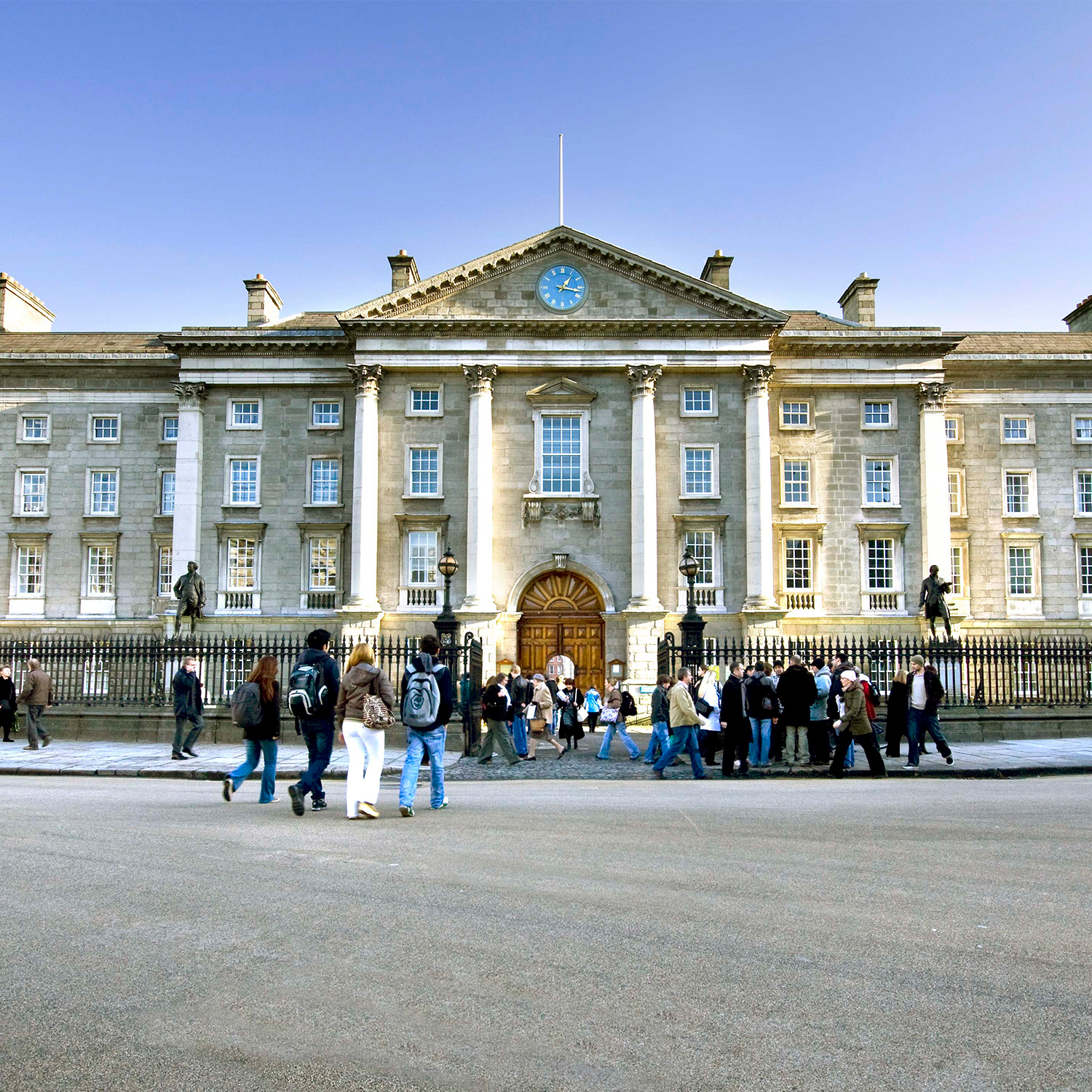Greece
Greece
Welcome to Trinity College Dublin, Ireland’s leading university. Prospective students from Greece can discover more about Trinity including contacts and equivalent entry qualifications for undergraduate and postgraduate study below. You can also register your interest to find out more.
Undergraduate Requirements
Trinity is delighted to accept students who have completed the below qualifications from Greece:
Recognised School Leaving Qualifications
Apolytirion of Lykeiou is acceptable up to 525 points. To attain over 525 points, additional points will be awarded for successful completion of a first year university examination taken in Greece provided it is taken in a recognised 3rd level institution at a level equivalent to that of the programme applied for. Please note that in some cases, specific subjects may be needed to meet entry requirements.
NB: Apolytirion of Gymnasio is not acceptable. For examinations prior to 2001, a separate certificate General (University) Entrance Examination is also needed.
Minimum Entry Requirements
Overall minimum of 17 in Apolytirion with 6 distinct recognised subjects 17 or better to include English, Mathematics and another language.
English Language Competence:
Please see list of acceptable English Language Qualifications.
Specific Course Requirements
This table shows what is required in terms of the Greek Examinations to meet specific subject requirements.
Subject Grade Comparison: NB NOT for points conversion - for this see separate table below |
|||
LC Higher |
Apolytirion |
LC Ordinary |
Apolytirion |
H1 |
N/A |
O1 |
18.5 |
H2 |
20 |
O2 |
18 |
H3 |
19.5 |
O3 |
18 |
H4 |
19 |
O4 |
17 |
H5 |
18.5 |
O5 |
17 |
H6 |
18 |
O6 |
17 |
H7 |
17 |
||
Indicative Points Equivalence
As a guideline it is anticipated that the indicative equivalence will be calculated as follows:
Points Equivalence Table |
|
Overall Mark |
IPS |
20 |
525 |
19.5 |
504 |
19 |
483 |
18.5 |
462 |
18 |
441 |
17.5 |
420 |
17 |
399 |
| 16 | 358 |
| 15 | 331 |
| 14 | 304 |
Provided there are adequate distinct recognised subjects and no repeat attempts included, the average as calculated on the Apolytirion will be used. To attain over 525 points, additional points will be awarded for successful completion of a first-year university examination taken in Greece provided it is taken in a recognised 3rd level institution at a level equivalent to that of the programme applied for.
Please note that in some cases, specific subjects may be needed to meet entry requirements.
Single Sitting
All subjects are examined at the same time and points are calculated based on a single sitting.
Bonus points for maths: Not applicable
Students who have not completed the above qualifications can apply using one of the international examinations recognized by Trinity.
In addition, to qualify for admission to a degree course at the University you must:
- Meet the minimum matriculation requirements (pass grades in English, Mathematics, a language other than English, and a full set of valid subjects for your examination system)
- Display a high level of competence in the English language in one of the examination systems recognised by Trinity College Dublin.
Details on accepted English proficiencies are available on our Admission Requirements page
- Satisfy course specific requirements. Some courses will have additional requirements and restrictions for admission.
They will be detailed on the relevant course page at and on our Admission Requirements page
- Meet competitive standards for admission to the course.
Please note that posted scores are minimum entrance requirements only and do not guarantee admission. Where places are competitive, a student must have excellent examination results to qualify for a place on their preferred course.
These standards are indicative only and final assessment will be made by Trinity's Academic Registry.
Important note on your application
Applicants from your country will normally be defined by Trinity as EU applicants; this is based on residency rather than nationality.
Your EU/Non-EU status is an important part of your application and it is your responsibility to determine your correct status before making an application, as the method of application and requirements will differ.
Determining EU/Non-EU status (Undergraduate)
Determining EU/Non-EU Status (Postgraduate)
There are many different ways to come to University and Trinity encourages applicants from all backgrounds and circumstances to apply. For more information on alternative paths to Trinity, such as advanced entry transfers,
please see our guide to non-standard applications here
Postgraduate Entry Requirements
Postgraduate work in Trinity is academically challenging and the University has high academic entry requirements.
Applicants will need to:
• hold at least a 2.1 honors degree from an Irish university or equivalent result from a university in another country.
Determining EU/Non-EU Status (Postgraduate) The fees you will be expected to pay to attend Trinity College Dublin are determined by a number of factors. For more information on how to determine your course fees, and methods of payment, please see our detailed information on Fees and Finances. Undergraduate Fees and Finances Postgraduate Fees and Finances For more information on scholarship, funding and grant opportunities, please see below. General Undergraduate Scholarships and Funding General Postgraduate Scholarships and Funding Do I need a Visa to come to Ireland to study at Trinity? Our EU Recruitment Team is here to help you find out more about Trinity College Dublin, through on campus Open Days, visits to Trinity with your school, assistance for your guidance counsellors and more.
For more information please see Visit Our Campus. Education Agents Trinity works with education agents who can assist you with your application. Here is the list of our approved agents in your country: Brive, Athens
• display a high level of competence in the English language in one of the examination systems recognised by Trinity College Dublin. Details on accepted English proficiencies are available on our Admission Requirements page
Some courses may require higher standards or require you to take further tests or attend an interview. More detailed requirements for each course are listed on the relevant course page
If you have questions about the specifics of the admission requirements for a given course, or about the course itself, you should contract the course coordinator directly using the contact information available on the courses page.Fees, Funding, Scholarships
Trinity College Dublin offers a number of scholarship opportunities for prospective and current students interested in study or research at Ireland's leading university. Since its foundation in 1592, Trinity College Dublin has sought to assist students of limited means and reward academic achievement. Students are always encouraged to explore external funding options in their home countries.Visas
EU/EEA/UK/Swiss students do not require a visa to study in Ireland. If you are unsure about whether you are an EU/EAA national, see here for a list of all EU/EAA countries.
For general information on visas and immigration please visit our Visa Information section.
Meet us in your country
Email: info@brive.com
Website: brive.com/el/
Tel:+302152159858
Contact Details
If you have further questions about the application process you can contact the Applications and Admissions Team in Trinity’s Academic Registry
Email: Academic Registry - AskTCD
Phone +353 1 896 4500
Contact us
Click below to contact our Regional Managers for Europe. We are always happy to help answer questions about our programmes, entry requirements and student life.
Student Testimonials
-
 Peter BensonLL.B. (Law & Business)
Peter BensonLL.B. (Law & Business)
IrelandI chose to study at Trinity for a number of reasons including its students and alumni of Trinity with whom I spoke prior to sitting my leaving cert. Every one of them talked passionately about the remarkable student experience on offer in Trinity, driven primarily by the unparalleled culture of extra-curricular activities (societies and sports clubs) in the College, each with their own unique features. I got the impression that Trinity was a place in which you could become a more well-rounded person, form your world-view, and forge your identity. After 4 years of walking the corridors of Trinity, this has proven to be true.
-
 Rathaya TreerattMFA Stage Design
Rathaya TreerattMFA Stage Design
IrelandI wanted to study abroad in a country that speaks English. I found out about the Lir Academy, which is in Trinity. And I heard good things about Trinity. One of the things I enjoy most about me experience here at Trinity is to have a full facility ready to support when I study; Library, Clinic, Mental health clinic etc. Dublin is a very lovely cute city and people are friendly. Lots of culture and theatre. Outside of Dublin is also beautiful.
-
 Eirini ArvanitidouM.Phil. English Language Teaching
Eirini ArvanitidouM.Phil. English Language Teaching
GreeceWhat I enjoyed most about being a Trinity student in M.Phil. in English Language Teaching was that every day for me was a source of inspiration and a constant motivation to never stop dreaming. The university’s ability to interweave a variety of modules not only in Applied Linguistics but also in English Language Teaching and Speech and Communication Processing helped me broaden my horizons and deepen my knowledge in the fields of Second Language Learning Teaching and Acquisition.






